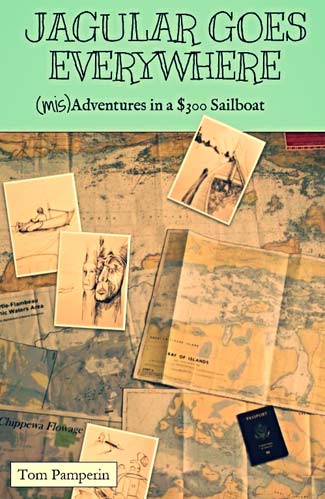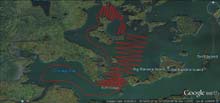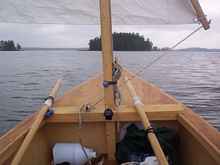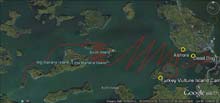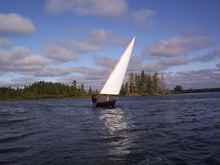
 Custom Search
|
| boat plans |
| canoe/kayak |
| electrical |
| epoxy/supplies |
| fasteners |
| gear |
| gift certificates |
| hardware |
| hatches/deckplates |
| media |
| paint/varnish |
| rope/line |
| rowing/sculling |
| sailmaking |
| sails |
| tools |
| join |
| home |
| indexes |
| classifieds |
| calendar |
| archives |
| about |
| links |
| Join Duckworks Get free newsletter CLICK HERE |
|
|
| JAGULAR GOES EVERYWHERE |
by Tom Pamperin - Chippewa Falls, Wisconsin - USA |
(mis)Adventures in a $300 Sailboat It’s official: I’ve finished my Jagular book! (Details HERE).
Many of you have been with us from the beginning, when Chuck Leinweber published Jagular Gets Rescued back in 2009. I hope you’ve enjoyed our adventures so far. You’ll find one more below. And thanks, Chuck, for getting me started. I owe you one. Again. If you’re joining Jagular and me for the first time, we’re glad to have you along. If you like today’s story, you can find more here: I hope these stories remind us all that when it comes to adventure, there’s no need for deep pockets or deep-keeled ocean cruisers. Adventure’s where you find it - and a small boat can find it much closer to home than a big one can. Finally, if you enjoy my writing, please support my book on Kickstarter.com before the project ends on March 4th - every little bit helps, and the sooner the better: It’s expensive to publish a book without a traditional publisher, but if you enjoy my writing, you can help make it happen. You’ll earn cool thank-you gifts along the way, too - T-shirts, bumper stickers (err, I mean transom stickers, of course), ebooks, signed copies of the book, and more! (See the Kickstarter link above for details.) Most importantly, please share the Kickstarter link with everyone you know - sailors, boat builders, friends, family, Facebook, Twitter, Google+, and whatever else you use. But don’t wait too long - the Kickstarter page will close on March 4th. After that, it’ll be too late to be part of it all. Many thanks, as always. Enjoy this exclusive Duckworks-only preview of “Jagular in the North Woods.” And remember: You don’t have to be prepared as long as you’re willing to suffer the consequences. Tom Pamperin Part One - Part TwoJagular in the North Woods - Part Twoby Tom Pamperin Continued from Part One... Next morning we're up early for a sail westward into Chicago Bay, then back to Pine Island for breakfast. After that we're off again, sailing away northward into the remotest stretches of the lake system. There's enough wind that Jagular and my brother's boat seem to be evenly matched today. In fact, we're actually pulling ahead. I'm relieved that we're doing so well for a change, but carefully avoid mentioning it lest my hubris invite a smiting. We continue farther into the maze of islands, stopping here and there to explore, until we pass through Minnesota Bay and round a corner into a sudden southeasterly wind that's hammering up a narrow channel, funneling itself between the trees like a torrent from a high-pressure hose. A wind from nowhere. And of course we've reached the northwestern edge of the lake, with nowhere to go but southeast, directly into the wind. Large trees are creaking and shifting overhead and branches are breaking off and we can barely manage to hold a beam reach across the channel. We pull into a DNR campsite at the north edge of the channel for some lunch, but even ashore the wind is fierce. There's no getting around it. We're going to have a tough beat back to Pine Island. "Or we could just go back the way we came and avoid these headwinds entirely," Jagular points out. "Faint heart ne'er won fair maid," I tell him. "Fortune favors the bold." And besides, my brother has already launched his boat and is tacking steadily down the channel ahead of us. Steadily, but very slowly. There's not enough fetch to create significant waves, but the wind is intense. I shove Jagular back into the water - the tall lateen rig gets tangled in the trees overhead until I carefully work it free - and we're off on a port tack, heading south across the channel. We'll have to short tack our way down this narrow passage for a mile, right into the teeth of it. Then at last we'll reach open water where we can make the turn south toward camp. "Here goes," I tell the boat as we approach the southern shoreline. "Tacking!" But no. "Tacking!" I say, trying again. Still not. But there's no way we can survive a jibe in this wind. "Tacking!" I say, louder this time, shoving the crude tiller to leeward, feeling it flex dangerously in my hand. And then the tall sail is tangled in the trees and branches are scraping along the mast and other branches are breaking off and falling on my head and we're aground. The bow slides up onto the island at the southern edge of the channel. I jump out into knee-deep water and start pulling the boat out of the trees. "Is that what they mean by cursing like a sailor?" Jagular asks. I'm too busy to answer, trying to get the boat pulled around into the wind to untangle the sail and manage the sheet and reset the leeboards for a starboard tack. Then I jump in and we're heading back north across the channel. The narrow channel. "Tacking!" I say. "Tacking!" And then the rig is in the trees and the boat is aground and we're back on the northern shore. We've made about a boat length's worth of progress to windward. I jump back into the water, drag the boat around, and re- launch on the port tack. "Tacking!" I say. "I'll say this for you," Jagular says. "You don't give up easy." And then the rig is in the trees and we're ashore again. "Which probably isn't a compliment in your case," the boat adds as I jump out and pull the boat around again. Another boat length to windward, almost. I reset the leeboards. Back on the starboard tack. I shove off into the channel and hop aboard. Up ahead the trees are waiting, waving wildly in the wind as if wanting to be sure we don't miss them. "Tacking!" I say. "Tacking!" Meanwhile my brother has tacked his way to the far end of the channel, where he turns south and disappears around a corner. And then the leeboards are scraping the sandy bottom and the sail is in the trees and we're aground again.
* * * Yesterday's endless beat back to Pine Island, tedious as it was, has only made me want more. Sailing through fog-shrouded mornings where islands appear out of the mist like passing ships. Rowing through star- studded moonless nights alive with red-eyed loons and great horned owls. Exploring the maze of islands and channels without regard for times and schedules and routines. Moving quietly through the world by sail and oar, in a boat too small to allow any mental distance from where I am, or what I'm doing.
But instead we're stuck ashore again, pinned down by winds too strong to fight our way past. We've spent the last few hours beating our way southeastward across a long stretch of open water, with Jagular thumping through the sharp chop and me hiking out on the side decks, expecting to be flattened by a gust at any moment. Expecting the tiller to snap off in my hands. Expecting something without knowing exactly what. We've never sailed in winds like this before, not even close. My brother has continued on out of sight up ahead somewhere, but we haven't been able to tack our way through the narrow channel he passed through to get there. Wherever there is. "We didn't even manage to reach the channel, actually," Jagular says. "It's not my fault you won't sail to windward," I tell him. No reply. "All right," I say finally, "it probably is my fault. But either way, we're stuck here for now." We've taken refuge on a lonely island at the southern edge of a swampy backwater bay, half a mile from where we last saw my brother. The wind has backed to the south now, twisting and shifting unpredictably through the narrow channels between the islands in an apparent attempt to bring us headwinds from every direction at once. Anywhere we go from here, we'll be launching from a lee shore. We'd be lucky to make a beam reach in these conditions. Which would put us back into the open water if we head west. The swamp, if we head east. "If we had real oarlocks instead of bungee cords, we could just row across the bay and through that narrow bit," Jagular says. "That's how your brother made it." "But we don't have oarlocks," I tell him. "We're going to have to sail our way out of here if we're getting out at all. And west is out - it's way too windy for us out on the open water with this stupid lateen rig. It's a lot worse than it was this morning. And there's no way to drop the sail without killing myself if things went wrong." "They probably would," Jagular says. "Sometimes the smart thing is to wait," I say. There's a long silence. "We're not going to do the smart thing, are we?" the boat asks. "Maybe not," I admit. "If we launch on a starboard tack, heading east along the shore, we might be able to make the channel on a close reach once we're back on the port tack." "We haven't managed a close reach since the day before yesterday," Jagular reminds me. "True. But the worst that'll happen if we don't make it is that we'll wash up in the swamp. You'll be aground in the muck and weeds, and I'll be stuck aboard until the wind dies down. That would hardly be the end of the world." "It might be," Jagular says. "You don't know what's in that swamp." I stare out at the bay, the violently wind-streaked water, the wildly swaying trees on the opposite shore. Then at the swamp to the east. "The hell with it," I say, taking a last look at the ridiculously oversized yard swinging crazily from the top of the mast, the big sail snapping and flogging. "Fortune favors the brave." Then I shove the boat into the water and pull it as far westward along the beach as I can get. If we don't lose too much ground when we tack, we might make it. * * * We don't make it. The wind is so strong now that we can't even manage to tack at all. I try again. And again. But each time we shudder to a halt and then fall back onto a starboard tack, heading eastward into the muddy swamp. I'd drop the rig and row but I can't rig the bungee cords without removing the leeboards, which would take far too long. Besides, the lateen yard is longer than a couple of Bengal tigers lashed together tail to tail, and twice as fierce. I'd be hammered senseless as soon as I uncleated the halyard. I could try to turn downwind and run back to the island but I'd probably jibe the yard and that would really be the end of it. With each failed attempt at tacking, the wind shoves us farther and farther eastward until finally we're aground in the mud with nowhere else to go. I have to let the sheet fly free or the wind is going to capsize us into the muck. Suddenly everything is chaos. The yard is swinging wildly from the top of the mast. The sheet is snapping and back and forth across the cockpit. And there's no way to escape the horrible stench we've sailed into, a cadaverous odor of rot and decay so powerful I can barely keep from vomiting. "If you're going to puke," Jagular says, "make sure you lean way out over the side." The sail is flogging madly overhead, the yard swinging around viciously until I'm afraid its weight alone will spill us into the mud. I'll have to do something about the mess before something goes very wrong, but I can barely think past the urge to vomit. With a sudden lurch I scramble for the side deck. False alarm. But still the smell surrounds me, the smell of things dead and rotting, a putrid unholy smell far worse than any odor I've ever imagined a swamp could contain. Another series of dry heaves wracks my guts, and again I scramble toward the side deck. Another false alarm. "I figured out why you're puking," Jagular tells me as I grab hold of the yard, trying to calm things down a bit. "Why's that?" I ask, barely able to keep from retching again as another wave of putrid stench washes over me. "It's a tragic tale of love and loss," the boat says. "Mostly loss. A family outing on the water. A faint startled yelp that goes unnoticed. A sudden splash. Our hero dog-paddling desperately behind the rapidly disappearing boat. The crew all unaware. A spastic snuffling struggle for breath. A final whimper. Then silence." In other words, there's a dead dog floating in the weeds just off our starboard bow, bloated and obscene and tragic all at once. "The hell with this!" I say, retching again. Holding my breath, I uncleat the halyard and drop the yard and sail into the swamp. Somehow I don't get clobbered. Then I pull the whole mess aboard, unfasten the leeboards and throw them into the cockpit, and rig the oars. I use a bit of line to roll up the sail and lash the eighteen-foot yard to the mast above my head, and tie the other end of it to the rudder. There's enough headroom now to row. Barely. "We still don't have oarlocks," Jagular says. True. But I'm hoping that dropping the yard and furling the sail has reduced our windage enough that we can make some progress. I start rowing carefully westward across the bay, trying to hug the windward shore where it's a little calmer, pulling as lightly as I can to avoid stressing the bungees. It seems to be working for now. We're working our way slowly out of the swamp, out toward the narrow channel to the north, our only escape route. We might make it this time. * * * "Well, we gave it a good try," Jagular says as the oars pop off the leeboard cleats again. And again. It's too windy. After all the effort we still can't manage enough power to row dead upwind through the channel. The stretched-out bungees just can't hold the oars in place. We're going to be pushed back. I take some comfort in the knowledge that we've made enough westward progress that we won't end up in Dead Dog Bog this time, though. That's worth something. Once we're safely ashore again, I wander up and down the tiny beach and wonder what my brother is doing, how far ahead he is. He could be having his own problems with this wind, I realize. His boat is smaller, after all, with less freeboard. No flotation. Less seaworthy than Jagular overall. If he's capsized somewhere in a big gust he might be in real trouble. And there's nothing I can do to help from here. "There's nothing you could do even if you were with him," Jagular says. "You can't even save us." I try to come up with some kind of response but he's right. We're stuck. If my brother's in trouble, he's on his own. No one can save him now but himself. He should have been more careful. Should have built a better boat. One that could handle this wind, these waves. Off in a dark corner of my mind I hear a faint splash, a snuffling struggle for breath. How easy it would be, to fall overboard. Capsize. Wash up somewhere in a swamp. And then I see him, rowing calmly back through the channel and across the bay, mast down and sail neatly stowed aboard. The wind pushes him along at a furious pace, with just a gentle stroke of the oars now and then. Soon he's stepping ashore and pulling his boat up onto the beach beside Jagular. What's the holdup, he wants to know. What's taking so long? I explain what happened, how I can't manage to row anywhere in this wind with my bungee cord oarlocks, and can't make any windward progress under sail. And worse, the narrow channels are funneling the wind in all kinds of conflicting directions, creating headwinds that can't be avoided no matter how often we try to change direction. Still, there's nothing to do but try again. We set out once more from the island, rowing north across the bay. And again, no. It's too windy to row through the final channel. We'd make it with oarlocks. Bungee cords aren't going to do it.
I'm about to give up when my brother suggests a tow. I tie a line to Jagular's mast and toss the other end to him. He cleats it off and starts to row up the narrow channel, dead into the wind. I manage to provide a feeble rowing assist when I'm not re-tying bungees. With both of us rowing we're able to finally make it through the last stretch. We've escaped from Dead Dog Bog. A little farther on we beach the boats again to wait for the wind to die down. My brother is too nice to say anything about the tow but I suspect he's pleased. A wrong has been righted. Order restored. Ineptitude amended by competence. "For now," Jagular says." * * * By evening the wind dies down enough that we're ready to sail. There's a campsite just up ahead, on the east side of Turkey Vulture Island-which still doesn't match the map. We're sailing past a grove of tall dark pines spread across an island that shouldn't be there at all. I puzzle over it for a few moments before giving up and flipping the map over to read the back side as Jagular sails along untended. The back side, it turns out, is a DNR pamphlet filled with information that somebody decided would be useful for visitors to the north woods. It's divided into sections. There's CAMPING. MANAGEMENT. WILDLIFE. THE FISHERY. And BOATING, with a little clip art icon of a bass boat on wavy blue water. I start with BOATING: The Chippewa Flowage has an abundance of sand and rock bars, stumps, floating bogs and floating driftwood, the pamphlet tells me. These features are not shown on the map provided and it should not be used for navigation. "Typical," I tell the boat. "There's something wrong with a civilization that creates maps and then forbids them to be used for the only purpose they could possibly serve." "Here we go again," the boat says. "Risks must be eliminated." "You say that like it's a bad thing." "Safety first!" I shout. "And obedience! Strict adherence to social norms! Forget about personal responsibility. Everything not forbidden is compulsory!" But at least I've found the answer to the mysterious uncharted islands we've been seeing: they're floating bogs. Huge mats of vegetation that form virtual islands adrift on the lake, at the mercy of the wind-here today, there tomorrow. Some of them, I read, have held together for so long that they are covered with forty-foot trees. That's what has thrown us off these last few days. I look closely at the island just off our starboard bow and through the dark water I can see that the whole thing is floating on an immense tangle of tree roots, branches, and driftwood. There'd be room to swim right under it to the other side if you could hold your breath for 400 yards. "Good luck with that," Jagular says. "No way," I tell him. "I'm not as dumb as I look." "No," the boat agrees. "I'm not sure that's even theoretically possible." I don't bother to reply. Soon enough we're out of the wind and into the lee of Turkey Vulture Island - the real thing this time, not its annex of floating bogs. The campsite is just ahead, more tall pines, a nice sandy beach. My brother, as usual, is in the lead. He sails onto the beach and steps ashore while we're still a hundred yards out. Aboard Jagular I start to relax, finally. It's been a long day. My eyes are tired from too much sun, my face wind-burned, my hands cramped from holding the sheet and tiller for hours at a time. My body aching from hiking out. My brain worn down from the stress of hours spent expecting disasters that never fully materialized. I'm ready for a fire, a hot drink, a cozy sleeping bag. "You never bother with campfires," Jagular interrupts. "Or hot drinks. Most nights you don't even take time to light the stove." "Conserving fuel," I explain. "Laziness," the boat says. "Same thing." "And you don't even have a sleeping bag," Jagular continues, "just a ratty old poncho liner your brother stole from the Army twenty years ago. That's why you always get up so early-you're too cold to keep sleeping. You pretend your early rising reflects hardiness or stoicism or something but really it's just stupidity." All true. But for now I'm happy to be out of the wind, coasting through a quiet bay, the campsite just fifty yards away. We've done all right today. Mostly. Then I glance around the cockpit and notice I've left the bulkhead hatch open. No big deal here in this sheltered bay, but if we had capsized out in the open water like that, the entire bow chamber would have flooded and who knows if we would ever have gotten out of that mess. I reach down and slide the hatch cover into place, press against it until it's tightly sealed. No need to get too lazy. And then a sudden gust fills the sail, jibing the heavy yard and heeling the boat dramatically to starboard. I scramble for the port side deck but we're still rolling. I can hardly believe it, but we're going over, fifty yards from the beach. Everything slows down. There's plenty of time to realize what's happening and no time at all to do anything about it. And then Jagular is on his side and I'm neck-deep in the dark water beside him, laughing. The worst has happened and it wasn't very bad at all.
"Pilot error," says Jagular. "Act of God," I tell him, swimming to the halyard and pulling the mast free. I roll the boat back upright and, still treading water, start to roll the sail up around the yard. Before I get far with my salvage efforts, though, an aluminum fishing boat zips into sight, motoring directly toward us. Two fishermen aboard in flannel shirts, baseball caps and sunglasses. Engine roaring now, speeding up. "Great," says Jagular. "Two rescues in one day." "Being towed for twenty yards isn't exactly a rescue," I say. "Debatable." "Anyway, there's no way I'm taking a rescue now," I tell the boat. "It's awfully nice of these guys to come rushing over, but we don't need any help." And then they're here, the driver spinning the boat around and throttling back the motor until the boat slows to a stop behind us, the wake almost capsizing Jagular again. "Hey!" the driver shouts. "Here we go," says Jagular. "I don't-" I start to say, but the boat driver isn't talking to me. He's shouting to my brother, who is busy sliding his boat back into the water to come see if we need any help. "Hey!" the driver shouts at him again. "Are you guys camping here tonight?" "We were planning to," he calls back. The fishermen look at each other for a moment. Then the driver throttles up the motor and spins the boat around, heading back out into the lake without a word to me. Their wake washes over us again and then we're alone, the drone of the outboard fading slowly as they disappear. "I'm voting in a new captain," Jagular says. "You can't even get us a rescue." "Look around," I tell him. "I don't see a whole lot of other candidates." "I'll keep looking," the boat says. Around us the north woods-what's left of them-fade slowly into silence, the last light of the day fading slowly from the sky. It's going to be a beautiful night. Somewhere across the water a loon calls, and another answers. The wind has died down, the skies have cleared. The only sound is the gentle splash of oars as my brother rows out to offer us another tow. I grab the bucket from Jagular's flooded cockpit, climb aboard, and start bailing.
For more Jagular stories, check out Jagular Goes Everywhere: (mis)Adventures in a $300 Sailboat (book release in June 2014) here. |
To comment on Duckworks articles, please visit one of the following:
|
 |


